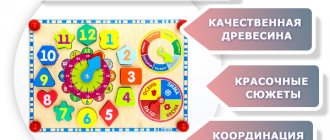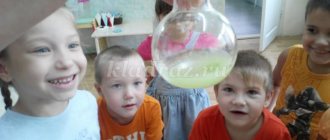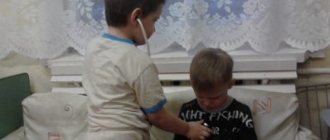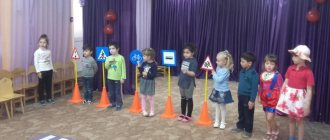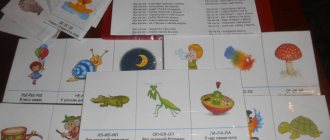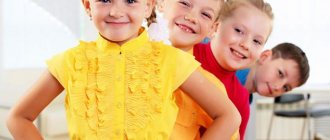MAGAZINE Preschooler.RF
Physical education activities in kindergarten.In a preschool educational institution, a child receives comprehensive development; under the guidance of educators, he develops mentally, physically, and morally. The emotional coloring of acquired knowledge is very important.
It is known that emotions play an important role in a child’s life, physiologist N.M. Shcheglov wrote: “Emotions not only constitute the most valuable psychological content of a child’s life, but also have a very important physiological significance in the life of the body . The very first stage of a child’s communication with the world is the emotional stage. This means that there should be a positive emotional atmosphere in kindergarten, this is facilitated by various forms of entertainment (musical, theatrical, physical education and others)
A special place is occupied by physical education leisure, which, with the correct selection of the elements included in them, can become an effective means of influencing a child’s personality. Physical education leisure and holidays contribute to the development of thinking, imagination, determination, and also form a sense of responsibility, teach them to restrain their desires and show determination.
During physical education, the child gets the opportunity to experience a pleasant feeling of joy from the movements performed by him and other children; rejoice in your successes and the successes of your comrades. During leisure time, children behave more spontaneously and relaxed than in physical education classes, which allows them to move without much stress, using the motor skills that they have already mastered, and to show artistry and aesthetics in their movements.
Physical education activities do not require special training for children. They are based on familiar material, but if new movements are used, they should not cause difficulties for children.
Options for physical education.
- Leisure is based on well-known games and play exercises (carried out in all age groups).
- Leisure time is based on exercises in basic types of movements and sports exercises (conducted from the second half of the year in the middle group).
- “Fun Starts” is based mainly on relay races (held in senior and preparatory groups).
- Leisure is based on elements of one of the sports games: basketball, football, hockey, table tennis, towns. (carried out in senior and preparatory groups).
- Leisure time is musical and sports (carried out in senior and preparatory groups).
In primary and secondary preschool age, a fairy-tale character can be introduced into the content of leisure activities. You can also use an entertaining plot. It is advisable to devote physical education leisure to the seasons, interesting sporting events, and public holidays.
Duration of physical education:
Junior group, middle group - 20 minutes;
Senior group – 25 minutes;
Preparatory group – 30 -35 minutes.
The success of physical education leisure activities lies not in the special preparation of children for them, but in everyday, large, serious work with children on the development of movements.
| Next > |
Article on the topic “Physical and leisure activities in preschool educational institutions”
The education system in Russia today is undergoing significant changes. Innovation processes have not bypassed the sphere of preschool education. At the present stage of development of the preschool education system, one of the important issues is the search for new methods and forms of upbringing and education of preschool children. Currently, there is increased attention to the child’s personality. The importance of leisure as a form of working with children is the formation of a healthy, active, harmoniously developed creative personality.
The life of a child in kindergarten cannot be imagined without fun leisure activities, entertainment and holidays. A leisure form of work with preschool children helps to increase the effectiveness of children's activities and allows for a variety of methods of pedagogical influence on preschoolers. In the organization and conduct of children's leisure activities, the unity of solving basic pedagogical tasks, such as educational, educational, developmental and correctional, is realized. The formation of his physical qualities and motor skills is also connected with the mental development of the child, with the development of the moral and volitional traits of his personality.
When preparing and conducting physical education leisure and sports events, children get the opportunity to show activity, initiative, independence, and creativity, which has a beneficial effect on the development of their abilities and personal qualities.
An important result of the holiday is the joy of participation, victory, communication, and joint activities. Outdoor games, relay races, which constitute the main content of any physical education leisure or sports festival in kindergarten, are more adequate than other forms of organizing motor activity to the needs of the child in movement and contribute to his harmonious physical development, development of dexterity, speed, coordination of movements, the most important morally. -volitional qualities. The process of preparing for the holiday unites the children's team, children and adults (teachers and parents) with unity of purpose and common goals.
During any holiday, a comprehensive solution to a number of tasks is carried out that contribute to the harmonious development of the child, but at the same time the main task is set, in accordance with which the theme and content are selected, and methods and techniques of work are determined.
The kindergarten hosts a variety of leisure activities and holidays:
- promoting the formation of a healthy lifestyle are thematic holidays, such as “Defender of the Fatherland Day”;
- cultivating a strong interest in physical education and sports, in personal achievements - “Fun Starts”, “Olympic Games”;
- holidays that promote a good mood are musical and sports holidays and joint holidays with parents “Multi-colored hoops”, “Mom and I are best friends”, etc.;
- developing creative activity, initiative, communication skills - “Fizkult-hurray!”, “Call of the Jungle”, etc.;
- forming cognitive activity - children solve riddles, solve problematic problems;
- nurturing moral qualities - children unite with the goal of helping the characters in trouble “Let's Help Aibolit”, “At the Bear in the Forest”.
Holidays in kindergarten are based on a combination of different types of physical exercises: gymnastics, outdoor and sports games, sports exercises. The purpose of such holidays is to attract children aged 5–7 years to competitive activities with elements of sports, and junior and middle preschoolers to perform simple gymnastic exercises and participate in outdoor games and fun. Seasonal holidays are also organized - summer and winter, as well as with the inclusion of elements of educational, visual activities, and theatrical performances.
Holidays are held in the gym, on the playground, using sports, physical education and tourism equipment, using natural materials, play aids, and homemade equipment.
Preparing for a holiday is a complex process that includes drawing up a script, distributing roles and responsibilities between participants, selecting musical accompaniment, decorating a site or hall, preparing sports uniforms, emblems, invitations, etc.
The duration of the holiday is determined by the age of the participants: 40–45 minutes for children 4–5 years old, 60 minutes for children 6–7 years old.
When drawing up a holiday scenario, the following requirements are taken into account:
- ensuring a gradual increase in mental and physical stress;
- alternating games and competitions with high physical activity and emotional intensity and tasks aimed at relieving tension (using poems, songs, nursery rhymes, counting rhymes, beginnings, etc.);
- alternating mass and individual games and tasks (if possible);
- participation and assessment of the activities of each child, taking into account his individual characteristics and capabilities;
- a combination of games and tasks that are familiar to children and evoke a positive emotional state with the inclusion of new attributes, music, and characters.
Particular attention is paid to the selection of music. Musical accompaniment provides an appropriate emotional mood, helps synchronously perform physical exercises, fills pauses, concentrates children's attention, and signals the beginning and end of a game-task.
As a rule, the physical education instructor assumes the role of the host, since the host of the holiday must always be artistic, be able to manage a group of children, know and take into account their characteristics, change, if necessary, the script of the holiday during the course of the event and regulate physical, mental and emotional load.
The culmination of any holiday is a surprise moment. Its content depends on the age of the participants and the type of holiday. These are, as a rule, fairy-tale characters who appear unexpectedly and perform a small performance in front of children. The characters participate in competitions with the children, do warm-ups with them, or the children teach the hero some skills and abilities.
When summing up the results, taking into account the mental state of the children, try to do this in such a way as not to injure the children - either “friendship wins” or awarding teams in nominations, for example, one is “The most dexterous and fastest”, the other is “The most friendly and cheerful” . At the end of the holiday, each child is awarded regardless of the place he took.
Literature
1. Stepanenkova E.Ya. Theory and methods of physical education and child development. - M.: ASADEMA, 2006.
2. Stepanenkova E.Ya. Physical education in kindergarten. Program and methodological recommendations. - M.: Mosaika-Sintez, 2006.
3. Education and training program in kindergarten. Ed. M.A. Vasilyeva, V.V. Gerbova, T.S. Komarova. - M.: Mosaic - Synthesis, 2005.
4. Lysova V.Ya., Yakovleva T.S., Zatsepina M.B. Sports events and entertainment for preschoolers: Scenarios: Senior preschool age. - M., 1999.
